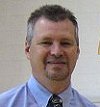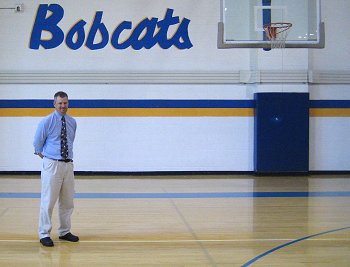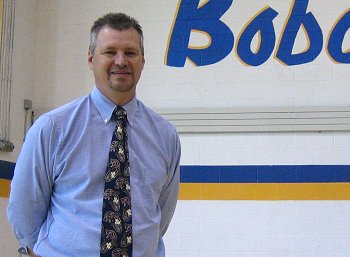- By Dan Veaner
- Sports
 Print
Print  John Taylor agreed to an exclusive interview with the Lansing Star two weeks ago, on his fourth day at Lansing High School. He was just getting his feet on the ground in his new position as Assistant Principal, Athletic Director, and Director of Physical Education. In last week's installment he spoke about his background and training as a coach, physical education teacher, and administrator.
John Taylor agreed to an exclusive interview with the Lansing Star two weeks ago, on his fourth day at Lansing High School. He was just getting his feet on the ground in his new position as Assistant Principal, Athletic Director, and Director of Physical Education. In last week's installment he spoke about his background and training as a coach, physical education teacher, and administrator.This week we cover his philosphy of sports and education, lifelong sports and recreation, and what he thinks about Lansing's program and facilities.
Lansing Star: You live in Binghamton, right?
John Taylor: Correct. I live in the Town of Dickenson. My wife and kids are in Binghamton.
LS: Have you lived there all along?
JT: Pretty much, yes. My wife and I bought our house about five years ago, but have lived in the area all along.
LS: You are commuting. I understand this is less of a commute than you had when you were at Saranac.
JT: It's six of one, half a dozen of the other, because Saranac is just west of Plattsburgh. It was only a thirty minute drive into Saranac, but it was a four and a half hour trip from Plattsburgh to Binghamton to see my family. If I came home on a weekend I put 600 miles on my car.
I was away for three years, because I was living in Camden, and then Saranac.
LS: It's about an hour commute from Binghamton, right? So now you can live at home...
JT: Yes. And see my wife. While my commute on a daily basis is longer I don't have those four and a half hour trips to come home on a Friday.
LS: Do you plan to continue living in Binghamton and commuting here?
JT: Yes.
LS: It hasn't been a problem in this office, but there has been a problem in the Lansing administration that we all now think and pray is solved -- that at the higher level, and even the principal level to some extent, it's been hard to keep people here despite the face that it is a great school system with a great record of student achievement. It may be unfair to ask you on day four, but how do you view that?
JT: I think it's a very fair question. The first thing is that my Daughter is a senior at Chenango Valley. I don't want to move her away from her friends. You have children as well. Could you imagine to pull them up after they've set down roots in high school?
I'll sacrifice myself to drive back and forth now for her well being. Next year she'll go off to college. My wife is working on her administrative degree and she's a first grade teacher in Johnson City.
And I'm not tenured yet -- it's three years before you can be tenured. In two years the board could say, 'Thank you very much, we don't plan to have you back.' I have a home there. That's the nature of the beast.

In three years I'm tenured, my wife is done with her administrative degree. We start looking for a position for her. If we can find something centrally located between her position and mine we're going to do it and move closer to here.
We would love to find a place on the lake. I was looking at the view. I've lived here all my life, but now I look at some of those houses going in and think, 'Oh my God, the view looking down the valley at the lake is gorgeous. So down the road our living arrangements will be decided.
LS: And I wasn't implying that you should move right away. But what if the same job opened up in the City of Binghamton?
JT: I said to my wife I always knew I was going to work next to one of the Finger Lakes. We absolutely love the Finger Lakes. I have that opportunity right now. I was driving around the other day to see the community and get used to where people live, and see what kind of housing there is around here. I drove down by the lake and -- wow! This is just beautiful. And I came from a place in the Adirondacks where I was an hour away from Lake Placid. Where I was in Saranac you could look over the mountains and see White Face.
But it doesn't compare to the Finger Lakes. They said, 'No, Champlain is the best lake.' Maybe it's because this is where I'm from, but that's where I want to be.
LS: Let's talk about the administrative side. A lot of people in town are going to be interested in you as the Athletic Director, but as Assistant Principal you're going to have a pretty hands-on connection to the kids. Is it a different role?
JT: That's another one of those 'yes and nos.' Because you're a student athlete. Student is first, so your education is first and foremost. Even though I am athletically inclined -- and I wish somebody had done this to me -- nobody pushed me into academics in the proper manner. Nobody told me it was important.
As a vice principal I can see both ends of the spectrum. I'll say, 'Yes you are a basketball player, but you have got to get your academics done. You can be All-State, but if you are not passing where are you going to go?'
LS: And if you're not passing you're not playing.
JT: Yes. And I'm not going to make exceptions. I won't say, 'You're the star, go play.' It's not going to be that way.
LS: Will you be doing things like going into classrooms, observing, that sort of thing?
JT: Yes.
LS: What about things like teacher evaluations?
JT: I'll be doing that as well.
LS: If you were putting the Assistant Principal part of the job description in a nutshell, what other kinds of things will you be doing?
JT: Whateve needs to be done. Michelle will ask me and I'll do it. You're the assistant principal. I guess it's the same as Vice Prresident? What does he do? It's an important role, but what does he do? (laughs) Now in this election it could be 'she.'
LS: Michelle has a very hands-on approach to her job.
JT: She knows the kids very well. I have been very impressed in the four days that I've been here. She knows all the students' names. She knows exactly what they're taking. She really has a good rapport with them. She jokes around with them, but they have a good respect for her. It's impressive.
LS: Do you do that? The other way is the good-cop bad-cop approach.
JT: Once I get to know the kids I hope that I will have a good rapport with them. I'd like to be known as a safe haven for them. If somebody wants to come in here and close that door and talk I hope I can build that relationship with these students. I feel that I've had that wherever I'vegone. It's a matter of them having the time to get to know me and know who they can open up to.
But every community is a little bit different. But I hope I can build that relationship with the student body as quickly as possible. But also: fool me once, but don't fool me again!
LS: The kids are not going to be getting away with murder...
JT: No. I did enough of it when I was younger.

LS: What do you want to ingrain in student players?
JT: First and foremost that they are a student athlete. The percentage of children that are going to go on to become pros is so, so low. I hope we get a lot of kids that can go pro, but the other thing is what do they have to back up on? If you get hurt and your career comes to an end what are you going to be able to do?
And if you have a long career, who's watching your money? You read it in the paper all the time how some accountant took advantage of some poor kid, and now he has nothing. I would hope that everybody who leaves me understands that I want to see them do the best that they can. I want to see them be successful their entire life, not just that brief period when they're in sports.
LS: How important is winning?
JT: I love winning! It's a tough thing, because one person is going to win, but one person is going to lose. You know that, and that's the joy of competition. It makes you want to be better. I've coached teams that were undefeated, and I've coached teams that never won a game. We had camaraderie on both ends of the spectrum. You would have thought the teams that lost would be miserable, but I hope that I made it an enjoyable experience for them. That they had a good time and they wanted to go on. They didn't act like losers.
But win or lose I hope you enjoy the sport and play it well. And treat your competitors and the officials with respect. And get enjoyment out of it. It's a game. It's not life or death. But I want to win. I always did. If you don't want to win then you're not in the right business.
LS: Is winning more important than other lessons learned by playing on a team?
JT: As a coach if I had the opportunity to win a game or meet and had an athlete who was one of my better athletes who was injured --- I could have put them in and they might have been fine. But the injury could have caused more damage. I'm not playing you. I want to win but I'm not going to risk your health just to win a game.
It's not life or death. There's tomorrow.
I was an athlete growing up. I twisted my ankle before a big race, and I remember it was huge and black and blue. I was limping, but when I walked by the coach I walked straight. I wanted to compete.
He happened to catch me limping, so he came over and kicked my ankle. When he saw it was twice the normal size he asked, 'Are you stupid?' 'No, I want to compete.' 'You can't compete on that.'
LS: What do you think of the facilities here?
JT: I'm very impressed. The track is gorgeous. The softball field is beautiful. I love the dugouts -- they are very well taken care of. There is a wide range of soccer fields. I like the football field and the lights.
I was surprised that the stands don't have a whole lot of seating. I asked at the soccer game last night, 'Do you just not get a lot of people come out to games?' They said, 'No this place is packed, and they love to sit on the hill.'
LS: You came in on Tuesday and practice had started for all the sports. I think some of the seasons had even started.
JT: Girls soccer had a game in the last week in August.
LS: So part of what you have to do is almost looping back because you weren't here for the planning and the beginning of the season. It's going to have to be a while before you start making your imprint. What do you see your job as being right now in terms of getting to that point?
JT: Learning the families, learning the kids, learning the IAC athletic directors, and knowing the district itself. There are a lot of things that are factors. Hearing parents talk, listening to them... hearing what they want. They pay the taxes. I work for them.
I want to do what's right for kids, and I want to do what's right for the Lansing district. I'll have to learn what Lansing wants and then fight for that.
Mr. Redmond was here for a long time. He had things down in a way that worked great for him. It may work for me, or may not work for me. I have to go through that trial and error period. People might hate some of what I do, and might love what I do. I hope we'll come to a happy medium and keep Lansing on top of the athletic spectrum.
You make it as easy as possible for the coaches and everybody involved.
LS: (Town Recreation Director) Steve Colt was on the search committee. I know in the past his programs have promoted the same philosophies and techniques for younger players that they will encounter when they get to the varsity level. Even though the town and schools are two different municipal entities the kids have a logical progression all the way through. Is that something you want to pursue?
JT: I have talked to Steve several times, and I see he is a very passionate man about his job. It's a great aspect of this area. I'm thrilled to have him here. I've used him as a resource already for some questions I had, and he was able to email me back with the answer.
I do want to see that. I like that. There was an athletic director, a former basketball and baseball coach down in Windsor, Gary Vale. He was there for 35 or 40 years. Before varsity basketball basketball games he would have his first and second graders come out and they were running the same passing drills that the varsity players were. Those second graders wore the black and gold colors of Windsor. I know that in their minds they were part of that program.
They didn't have the same skill level as the varsity players, but they did the same kind of warmup. That was a big thrill for them to go on the varsity floor at half time. I can see doing the same thing here.
When I was in elementary school I watched the varsity sports. There are three levels -- there is high school varsity, college and being a pro. That high school senior was two steps away from being a pro athlete. That was in my mind. I looked at that high school senior and I thought he was a god. I didn't see a normal 16 or 17 year old kid just doing normal 16 and 17 year old things. I saw a mature adult playing a sport and I looked up to him.
If you go down to the elementary school right now -- and tonight will be a good example, because we're playing Dryden in football -- I'll bet there will be a bunch of seven or eight-year-olds with their peewee football jerseys on that say Lansing. They look at those kids out there as mega-gods.
They are role models for these little kids. I think it's important to have that progression and feeling of ownership into the program.
And as a physical education teacher I want to see everybody active. Lifetime sports -- it doesn't matter if it's a team sport or not. You have that for the rest of your life.
LS: What are you looking forward to the most here?
JT: Becoming part of the community. I hope I can do something that I can do that helps make it a better program.
----
v4i36




